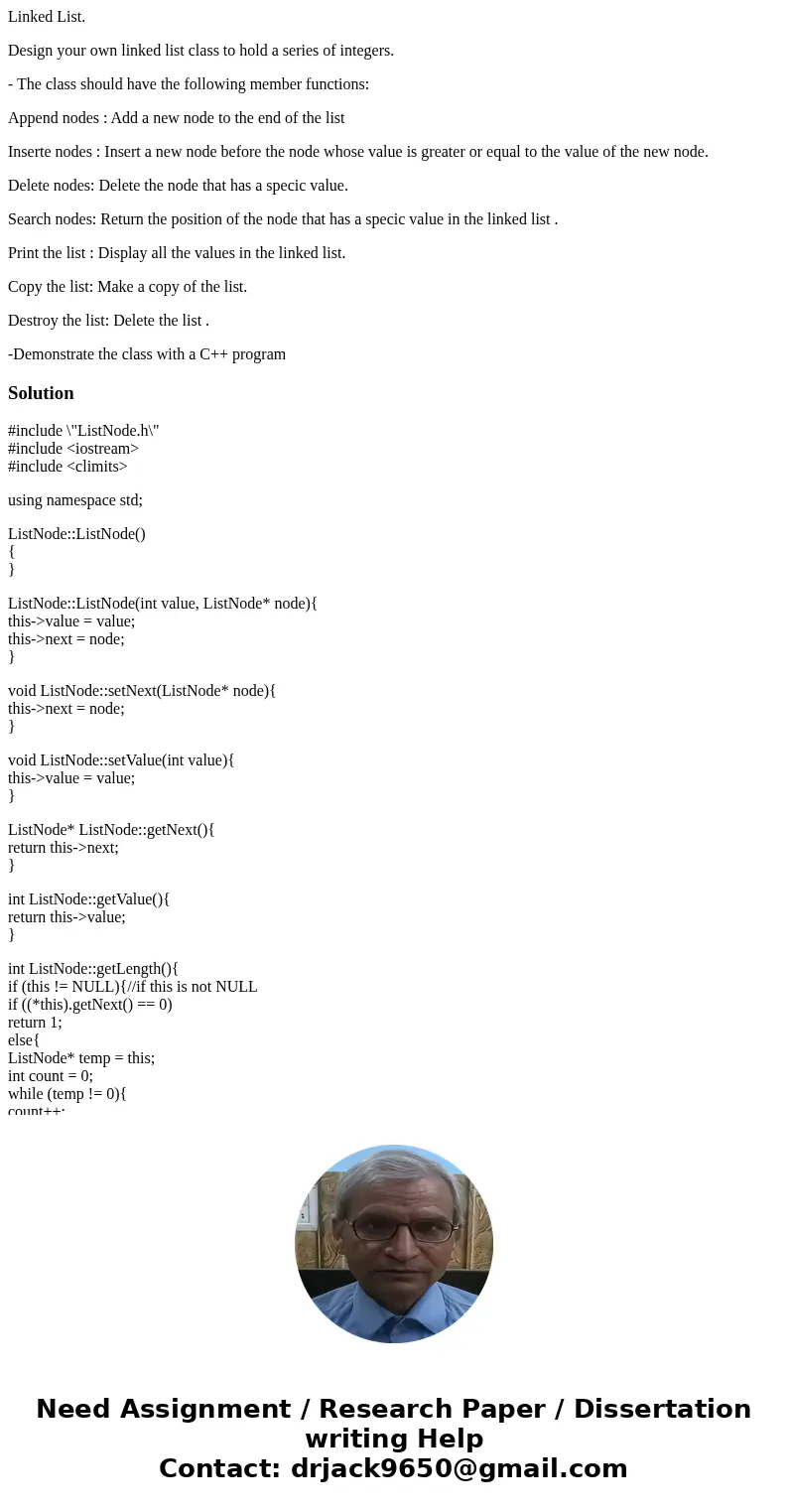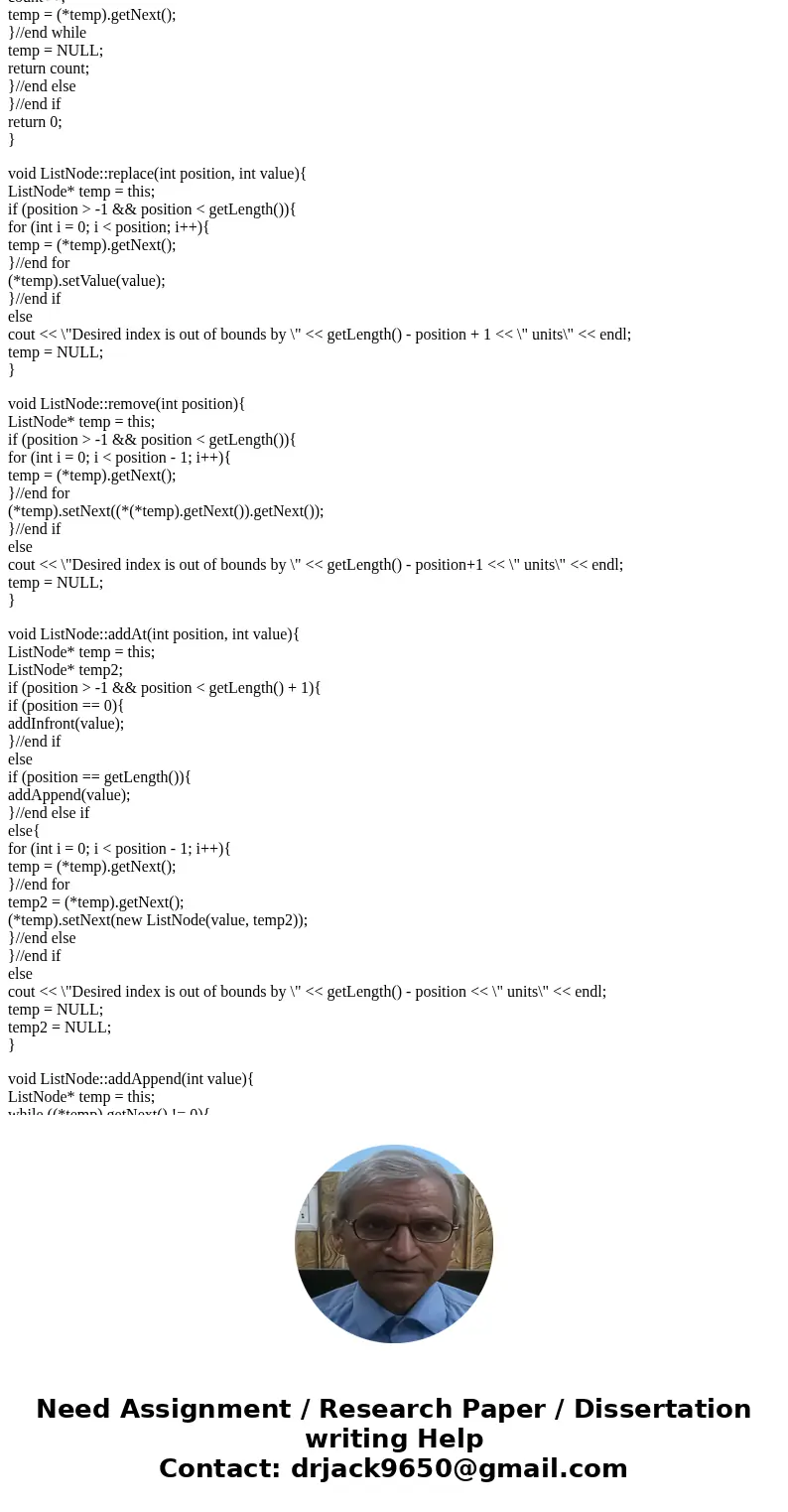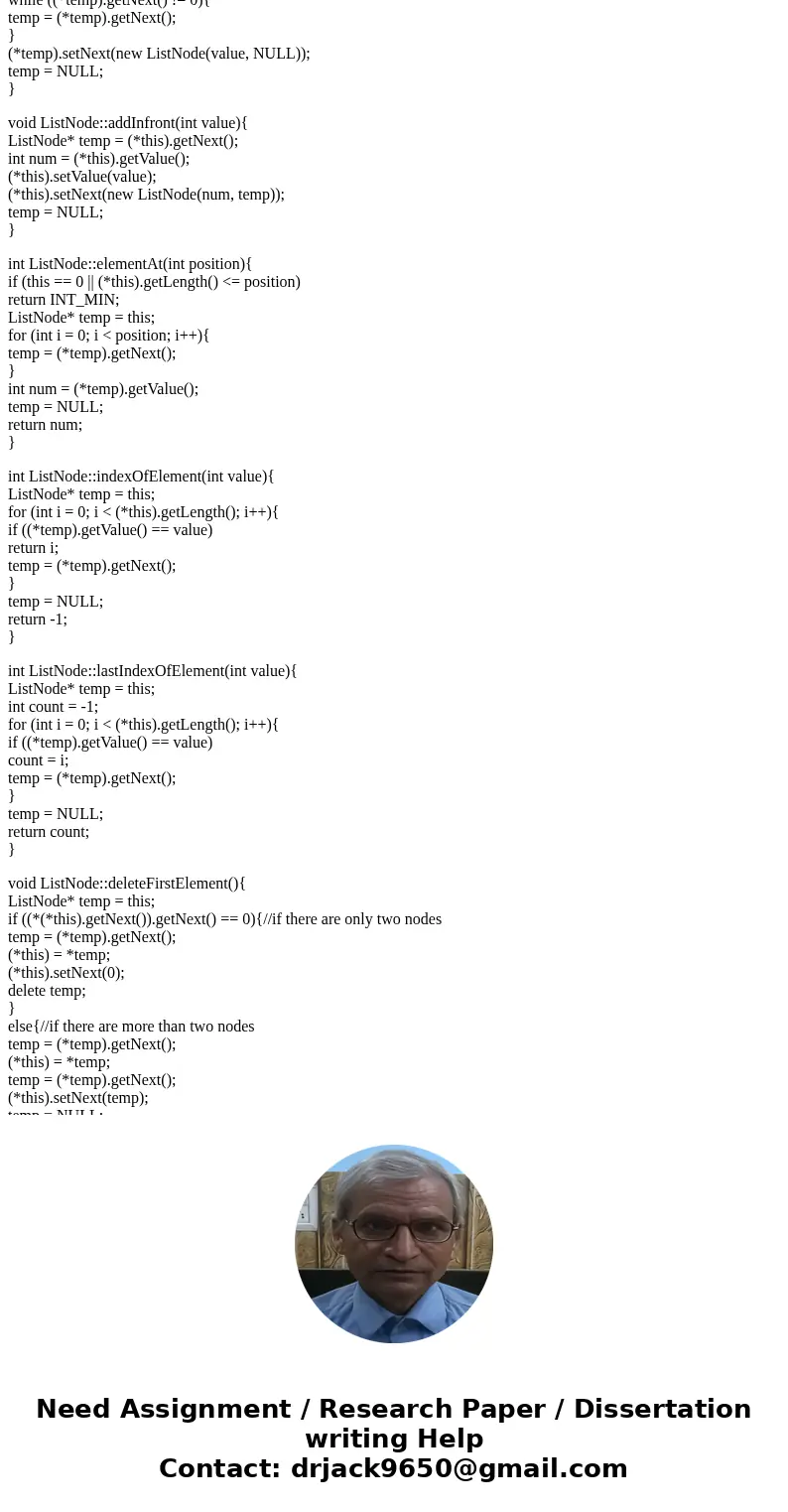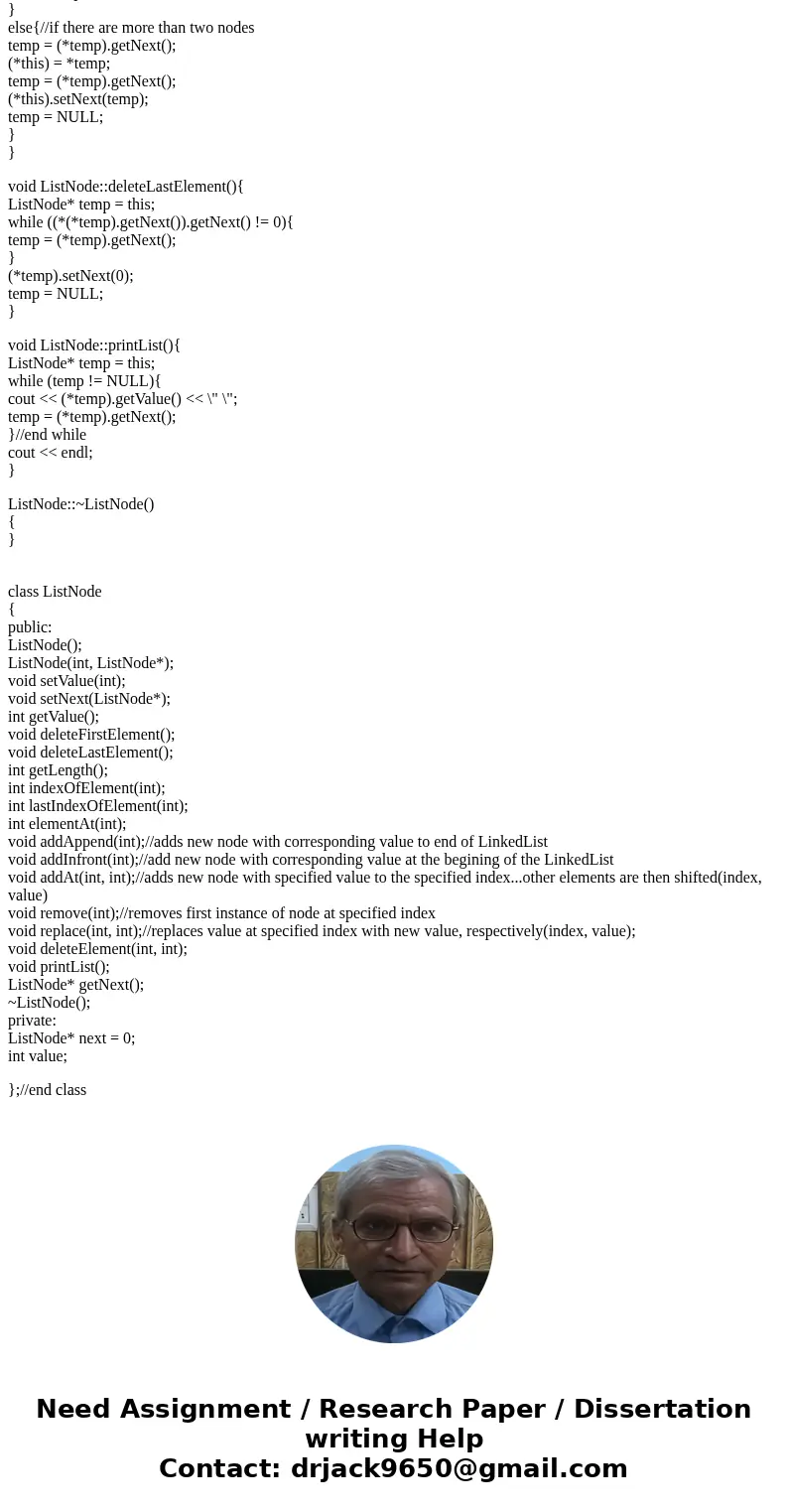Linked List Design your own linked list class to hold a seri
Linked List.
Design your own linked list class to hold a series of integers.
- The class should have the following member functions:
Append nodes : Add a new node to the end of the list
Inserte nodes : Insert a new node before the node whose value is greater or equal to the value of the new node.
Delete nodes: Delete the node that has a specic value.
Search nodes: Return the position of the node that has a specic value in the linked list .
Print the list : Display all the values in the linked list.
Copy the list: Make a copy of the list.
Destroy the list: Delete the list .
-Demonstrate the class with a C++ program
Solution
#include \"ListNode.h\"
#include <iostream>
#include <climits>
using namespace std;
ListNode::ListNode()
{
}
ListNode::ListNode(int value, ListNode* node){
this->value = value;
this->next = node;
}
void ListNode::setNext(ListNode* node){
this->next = node;
}
void ListNode::setValue(int value){
this->value = value;
}
ListNode* ListNode::getNext(){
return this->next;
}
int ListNode::getValue(){
return this->value;
}
int ListNode::getLength(){
if (this != NULL){//if this is not NULL
if ((*this).getNext() == 0)
return 1;
else{
ListNode* temp = this;
int count = 0;
while (temp != 0){
count++;
temp = (*temp).getNext();
}//end while
temp = NULL;
return count;
}//end else
}//end if
return 0;
}
void ListNode::replace(int position, int value){
ListNode* temp = this;
if (position > -1 && position < getLength()){
for (int i = 0; i < position; i++){
temp = (*temp).getNext();
}//end for
(*temp).setValue(value);
}//end if
else
cout << \"Desired index is out of bounds by \" << getLength() - position + 1 << \" units\" << endl;
temp = NULL;
}
void ListNode::remove(int position){
ListNode* temp = this;
if (position > -1 && position < getLength()){
for (int i = 0; i < position - 1; i++){
temp = (*temp).getNext();
}//end for
(*temp).setNext((*(*temp).getNext()).getNext());
}//end if
else
cout << \"Desired index is out of bounds by \" << getLength() - position+1 << \" units\" << endl;
temp = NULL;
}
void ListNode::addAt(int position, int value){
ListNode* temp = this;
ListNode* temp2;
if (position > -1 && position < getLength() + 1){
if (position == 0){
addInfront(value);
}//end if
else
if (position == getLength()){
addAppend(value);
}//end else if
else{
for (int i = 0; i < position - 1; i++){
temp = (*temp).getNext();
}//end for
temp2 = (*temp).getNext();
(*temp).setNext(new ListNode(value, temp2));
}//end else
}//end if
else
cout << \"Desired index is out of bounds by \" << getLength() - position << \" units\" << endl;
temp = NULL;
temp2 = NULL;
}
void ListNode::addAppend(int value){
ListNode* temp = this;
while ((*temp).getNext() != 0){
temp = (*temp).getNext();
}
(*temp).setNext(new ListNode(value, NULL));
temp = NULL;
}
void ListNode::addInfront(int value){
ListNode* temp = (*this).getNext();
int num = (*this).getValue();
(*this).setValue(value);
(*this).setNext(new ListNode(num, temp));
temp = NULL;
}
int ListNode::elementAt(int position){
if (this == 0 || (*this).getLength() <= position)
return INT_MIN;
ListNode* temp = this;
for (int i = 0; i < position; i++){
temp = (*temp).getNext();
}
int num = (*temp).getValue();
temp = NULL;
return num;
}
int ListNode::indexOfElement(int value){
ListNode* temp = this;
for (int i = 0; i < (*this).getLength(); i++){
if ((*temp).getValue() == value)
return i;
temp = (*temp).getNext();
}
temp = NULL;
return -1;
}
int ListNode::lastIndexOfElement(int value){
ListNode* temp = this;
int count = -1;
for (int i = 0; i < (*this).getLength(); i++){
if ((*temp).getValue() == value)
count = i;
temp = (*temp).getNext();
}
temp = NULL;
return count;
}
void ListNode::deleteFirstElement(){
ListNode* temp = this;
if ((*(*this).getNext()).getNext() == 0){//if there are only two nodes
temp = (*temp).getNext();
(*this) = *temp;
(*this).setNext(0);
delete temp;
}
else{//if there are more than two nodes
temp = (*temp).getNext();
(*this) = *temp;
temp = (*temp).getNext();
(*this).setNext(temp);
temp = NULL;
}
}
void ListNode::deleteLastElement(){
ListNode* temp = this;
while ((*(*temp).getNext()).getNext() != 0){
temp = (*temp).getNext();
}
(*temp).setNext(0);
temp = NULL;
}
void ListNode::printList(){
ListNode* temp = this;
while (temp != NULL){
cout << (*temp).getValue() << \" \";
temp = (*temp).getNext();
}//end while
cout << endl;
}
ListNode::~ListNode()
{
}
class ListNode
{
public:
ListNode();
ListNode(int, ListNode*);
void setValue(int);
void setNext(ListNode*);
int getValue();
void deleteFirstElement();
void deleteLastElement();
int getLength();
int indexOfElement(int);
int lastIndexOfElement(int);
int elementAt(int);
void addAppend(int);//adds new node with corresponding value to end of LinkedList
void addInfront(int);//add new node with corresponding value at the begining of the LinkedList
void addAt(int, int);//adds new node with specified value to the specified index...other elements are then shifted(index, value)
void remove(int);//removes first instance of node at specified index
void replace(int, int);//replaces value at specified index with new value, respectively(index, value);
void deleteElement(int, int);
void printList();
ListNode* getNext();
~ListNode();
private:
ListNode* next = 0;
int value;
};//end class




 Homework Sourse
Homework Sourse